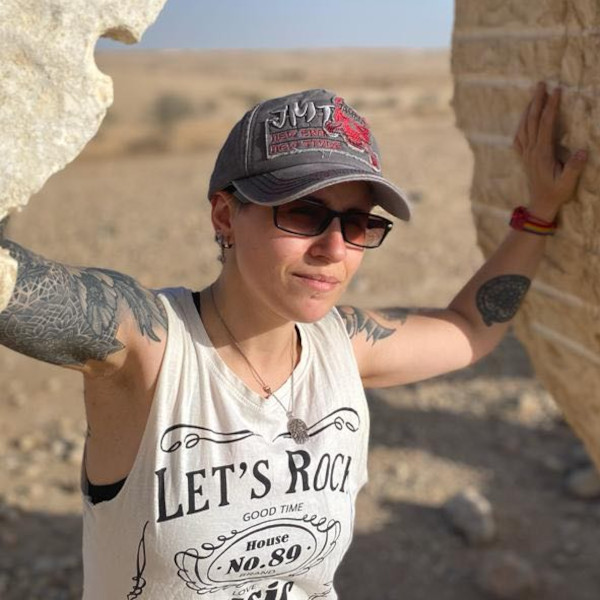Interviews with Olim
Each month, we interview an oleh or olah for our newsletter.
We invite you to read the stories of LGBTQ+ people who have made Israel their home.
"Aliyah was the best thing that happened in my life."
Interview date: June 2023
Q. Where were you born and where did you grow up?
A. I was born and raised in Yekaterinburg, a Russian city in the Ural mountains, not far from Siberia. How did our family get there? The story is trivial for most Ashkenazi Jews, unfortunately – numerous evacuations from the Pale of Settlement. My grandparents are natives of Jewish shtetls in Eastern Europe, Belarus and Ukraine. In the 1940s, people fled the war and the Holocaust, evacuated to the Urals and Siberia, so many Jews living in Russia have a very similar story. Actually, this is a separate important and difficult topic for discussion – that you are forced to grow up in a society to which you don’t belong, in a culture that is alien to you.
Q. At what age did you come out? And how did it go?
A. As I said above, an Ashkenazi Jew in the Russian outback is always a black sheep. When you are also an introverted queer, the situation becomes even more… curious. I can’t definitely say when I came out as gay person. I have always known about my identity. The problem is that for a long time, due to a complete lack of information and support, I was convinced that something was wrong with me. As do most of us. Unfortunately, there were periods when I tried to conform to the heteronormative norm just to “correct a flaw”, a form of self-abuse. Eventually, I stopped hiding and returned to myself only at the age of 22-23.
Q. Were you involved at all in the LGBT community in your birth country?
A. First of all, in Russia such activity was always illegal. I was involved to the extent that it was possible. Volunteering, helping people in most cases… In our city, we had a supportive community center, and I was known as the LGBT-friendly psychologist for people of all spectrums – for example, I often worked with transgender people.
Q. What is your involvement (if any) in the LGBT community in Israel?
A. Of course, Aliyah was long-awaited possibility to break free and become fully myself. I take part in pride parade every year in Tel Aviv and then in Be’er Sheva, in my city, I attend queer events, trying to light up as much as possible in social networks and in society modern queer discourse – especially trans, non-binary and asexual, as this is the closest to me personally.
Q. How long since you made Aliyah?
A. I moved to Israel in 2019.
Q. Did you move here on your own or with family/friends/significant other?
A. On my own – just with a little son and a cat. I met my fiancee here, three years after Aliyah.
Q. Why did you make Aliyah?
A. It’s a simple question from one side of sense – and complicated from the other. Why do Jews move to their homeland? Because it’s our homeland, our history, our soul place. I always dreamed of making aliyah, since my childhood, and sometimes it was very hard and dysphoric – to look at many of my relatives and family members leave Russia one by one, and I was a kid without the ability to leave. But it was just a phase – you understand ironic vibe 😉 At last, I succeeded to do what I want.
Q. How is it going so far?
A. It depends… Sometimes hard, sometimes like an eternal joy. Sometimes both. In fact, I never felt regret about my decision, Aliyah was the best thing that happened in my life. It’s worth all efforts and all the difficulties.
Q. What do you do in terms of work?
A. I am a clinical psychologist and psychoanalyst. So, here I do the same thing as I always did – working in the mental health field, doing scientific research, hoping to get a PhD in the future. Currently I am working in the emergency department in the Be’er Sheva psychiatric hospital.
Q. How is your Ivrit?
A. You can always do better, you know… especially in language studies. But I am trying my best. Also, in the medical structure you have no choice – all our work and internship is in Hebrew, and so it goes on.
Q. What has been your biggest challenge so far?
A. To legally enter the Israeli healthcare system with all the work experience and education that I got outside of Israel. It wasn’t simple and took a lot of effort and time to prepare.
Q. How do you perceive the Israeli LGBT community?
A. Warm. Supportive. Free. Shiny people with open hearts. It touches me a lot and makes me happy.
Q. How is being LGBT in Israel different to back home?
A. Very specific question – especially considering that in Russia for LGBT propaganda you would be accused as a criminal and imprisoned.
Q. If you were making aliyah now, would you do anything differently?
A. Maybe I would change my name immediately upon arrival at the airport. Unfortunately, I did not know that this could be done without going through bureaucracy. but other than that, everything was done exactly as it should. Totally satisfied with all the processes.
Eli

Our Newsletter
Sign up if you would like to receive a monthly email listing events of interest to LGBT English-speakers in Israel, an interview with an oleh/olah and other useful information.
Want to be interviewed?
Complete the form below and we will get back to you.
Our Newsletter
Sign up if you would like to receive a monthly email listing events of interest to LGBT English-speakers in Israel, an interview with an oleh/olah and other useful information.
Want to be interviewed?
Complete the form below and we will get back to you.


